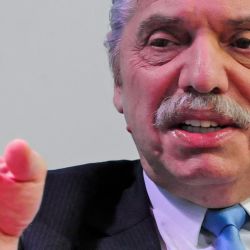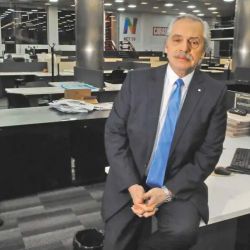Ex-president Alberto Fernández, who this week a judge ruled should stand trial for charges of gender violence and psychological mistreatment levelled against him by his ex-partner Fabiola Yáñez, is also facing a complicated corruption case in the courts.
In the second part of this feature interview, the 65-year-old former head of state tackles the allegations directly, denying wrongdoing in a case he says is not being judged by an impartial magistrate.
Fernández restates his enmity with judge Julián Ercolini and answers questions regarding his relationship with Argentina’s current President Javier Milei and former head of state Cristina Fernández de Kirchner, who unsuccessfully served as vice-president in his 2019-2023 government.
This interview has been trimmed and edited for clarity, though the ex-president’s remarks have not been altered.
The first part of the interview can be read here.
PART TWO: THE INSURANCE CORRUPTION CASE
The photos of [Fernández’s ex-partner, former first lady] Fabiola Yáñez with a black eye emerged from the forensic tests on María Cantero’s mobile telephone within the insurance case investigation. Why do you think Fabiola sent those photos if they were not friends, as you said earlier in the interview?
I think that has an explanation but I’ve only found out now because it really has no explanation. What I never understood is: Why María Cantero? Because she [Fabiola] had some very close friends, so why didn’t she send them to any of them?
What happened is that it began with a chat with María Cantero amid the media buzz surrounding Fabiola over the issue of the Olivos dinner, which caught Fabiola at an angry moment because she maintained that I was not defending her against the media like I should, asking me to intercede with the media to stop publishing that stuff and blaming me for not doing so. And you will bear witness that I never called here to tell you what you had to publish and what not, and nobody can accuse me of having done anything like that over any issue. In the years I was President, press freedom was absolute with everybody writing what they wanted.
I think that caught her at an angry moment and she let fly. I repeat that Fabiola has health problems so she went on the attack at that angry moment in order to show a series of things which were untrue. There were some chats but Fabiola did not know what chats were. And the last time Fabiola spoke to me last November, when she called me in the small hours of the morning from Spain and threatened me, there is a case open in the City courts over this issue. That was when she cut my ties with Francisco and she repeated that the culprit of everything is María Cantero. That conversation is recorded. ‘Yes, María Cantero,’ she told me. ‘What does that have to do with anything if you sent the chat?’ I told her. ‘I don’t remember sending it,’ she told me, and I believe her because I know of her problems – I know what she suffers from. But I also want to be careful with her. I believe her but she really has made a mess with all this.
Putting it another way, given the subsequent corruption accusations of steering insurance contracts in favour of Héctor Martínez Sosa, the husband of your secretary María Cantero, was Fabiola sending a photo of herself with bruises a message to you?
I never found out. María Cantero, testifying under oath, said she never told me.
Didn’t María Cantero tell you?
Never. I was totally surprised when it came out in the news.Nobody told me.
How did your secretary not tell you?
You also have to understand the context. In that case there are 164 pages of María Cantero’s chats with Fabiola, of which all this is three pages. And the next day they were talking about something else and continued talking as if this issue had never arisen. María Cantero never asked her again if her problems with Alberto were repeated and Fabiola never told her again: ‘I had this problem with Alberto.’
Your secretary would have to be a person of trust. Anything like that received from a person of trust and your secretary from your wife should be told to you.
Yes indeed!
So why didn’t she tell you?
No idea. She explained that she did not tell me because she understood them – or that’s what she testifies – to be questions of private life into which she should not meddle. But that’s how it was and I have no solution for that. I would love her to have told me.
Do you comprehend that each one of these things which do not seem very solid trigger a framework for interpretations on one side or the other?
If you had read my 200 pages, you would have seen how I rebut each and every one of the accusations which Fabiola makes in court. And I never said that Fabiola Yáñez was never injured in her right eye.
I’m referring to the issue of your secretary who did not tell you.
I haven’t the least idea why she did not tell me. I want to be frank, I was also surprised to find that there are 164 pages of Fabiola’s chats with María, because the truth is, as María testifies, that the bond between them was very distant.
So, trying to explain it, how many years have you known María Cantero? Since when has she been your secretary and what is your relationship with her?
A former student of mine, María became my secretary at the Superintendencia de Seguros [Insurance Superintendency] in January, 1990, accompanying me during all that period and all the years I was at Grupo Banco Provincia [Buenos Aires Provincial Bank] and when I was [a City] legislator but there was an interim when I only dedicated myself to consultant work, and she dropped out for a while. Afterwards, when I became a presidential candidate, she called me up and started working with me again. Those are many years.
And how is your relationship with her husband, Héctor Martínez Sosa?
Very cordial and affectionate but not commercial. It would be unfair to say that Héctor Martínez Sosa ever spoke to me about insurance contracts. He’s the heir of one of Argentina’s biggest firms of insurance brokers founded by his father Héctor Martínez Sosa Senior, a vice-president of Boca [Juniors Football Club] who became very famous for buying up [star footballer Diego] Maradona, a man with many links. His son inherited and boosted his firm, working all his life with state insurance.
Do you understand that your secretary being the wife of such a big broker while you were at the helm of the Insurance Superintendency might trigger suspicions?
I didn’t invent state insurance, it’s always been around. That’s why one of the things I requested of the judge was: ‘Can you ask who had the insurance beforehand?’ Because I’m sure they were the same people.
To explain to readers, you stand accused of steering the choice of brokers.
But that’s magnificent hogwash.
Respond to that accusation.
In Argentina, from the times of [Juan Domingo] Perón to [Carlos] Menem, state insurance was also in the hands of a state company, insured by the Caja Nacional de Ahorro de Seguros with reinsurance also handled by one single state company.
What was the logic? That public funds should remain in public hands because they are very strong tools of economic policy. In the 1990s, Menem privatised the Caja Nacional de Ahorro y Seguros, thus creating a state insurance business cartel until I put an end to it.
How? By returning state insurance to a state company. What did the cartel consist of? State insurance is very costly and not to be handled by anybody, needing very solid companies. Very few can insure the state because state insurance is not just the state car fleet.
Wasn’t it like that when you headed the Insurance Superintendency?
Yes, state insurance was in the hands of the Caja Nacional de Ahorro y Seguros.
That’s what I mean.
It was privatised while I was the insurance superintendent, which is when the massacre of state insurance by the cartel of companies began.
But the privatisation you criticise happened while you were heading the Insurance Superintendency.
I was also highly critical at that time. What ends up happening is that very few can take on state insurance because people think it’s just about insuring the state’s cars. The Education Ministry’s life and car insurance, for example, was one of the most questioned because its insurance advisor had one of the most important art collections in Argentina. Does an Economy minister know how to calculate that risk? The [state] satellite company ARSAT, how do you calculate that risk?
We’re agreed that there must be insurance, the question is ...
My final comment is that all that money went to five or six companies.
Who were those brokers?
No, they were insurance companies, all with brokers as middlemen collecting lofty commissions.
So there were brokers then and brokers now.
They were there beforehand.
And what did you do?
I prohibited them. What happened is that many said that they needed somebody to advise them so they asked Nación Seguros to name an advisor. In general, the insurance companies pick the advisors. So these people came along who are not middlemen but insurance advisors. What I want you to understand is that of all those taking on state insurance, those with insurance advisors were very few, not the entire state. What I want to explain is that this measure passed through Nación Seguros, Banco Nación, the Economy Ministry and the Treasury and Legal and Technical Secretaries. It came with an Article Three, saying how the brokers should intervene and I eliminated that article.
So did you hurt or benefit Héctor Martínez Sosa with that measure?
But if you saw the statements of the brokers in that case, the brokers ask: ‘Explain to me what I gained with all this.’ I’ll give you an example. Insuring a building against fire, the commission was around 30 percent and as from my decree 10 percent. Insuring a car, the commission was around 25 percent and as from my decree 10 percent.
Explain to me whom I benefitted. If I benefitted anybody, it was the state. Nación Seguros closed its annual balance in mid-2023 with a profit of 90 billion pesos and in mid-2024 with a loss of 4.5 billion pesos.
CRISTINA AND MILEI
Cristina [Fernández de] Kirchner also feels mistreated and in a certain sense attacked by you, because you did not respond to her expectations, as continually marked by her letters. Mutatis mutandis – do you find some symbolic point of contact between the sentiments of non-reciprocity of Cristina and Fabiola?
I do not understand the question. For me they are two absolutely different things. Fabiola is a person with, I repeat, a different set of problems about which I do not wish to speak but which I know to perfection, as I have commented to the judge, giving him all the evidence of what is happening there.
And Cristina?
Cristina’s problem was not that I did not answer her but that I didn’t obey her. But it was up to me as President to make decisions. In some of them we agreed and moved on the same track and in others we didn’t.
Is Cristina now doing the same thing to [Buenos Aires Province Governor Axel] Kicillof as she did to you?
I don’t know if she’s doing the same. At this stage I definitely share nothing with Cristina and the distance between us is huge.
Kicillof has said something I believe to be correct and that I honestly said on November 17, 2021, after losing the PASO primaries. In Plaza de Mayo, in front of the Casa Rosada, I said that it was time to end the leaders hand-picking candidates, time that the people voted [for them] and time we changed the direction of our politics because we could not ignore having lost the elections.
Everybody kicked up a scandal because I was asking for [a real] PASO, primaries without any conditions. I haven’t spoken to him for a long time but if Axel is now seeing the need for a new melody, I think that he is well in tune. And the worst thing we could do is to propose that people buy our new disc with the same songs as always. And on that basis if somebody says: ‘Let’s open the doors, listen to the people, relate to others and let the decisions be made jointly in open and clear elections’ …
When in previous interviews you explained your difficulties in the relationship with Cristina, the Milei phenomenon did not exist. Today Milei, with a handful of deputies and senators and no governors or mayors with Cristina against him, is passing laws and implementing his measures, independently of whether they are good or bad, which you do not share. Seeing that, do you not feel you could have done something different?
We should have done something different, clearly, and I have to take my share of responsibility for all this. One thing which also alienated people from us was the infighting so one of the last things I want to promote now is infighting. I do not want any of the words I say to be interpreted in the sense of a rift but simply reflection. Here nobody is surplus to requirements nor should go missing. Cristina has her place in history and that is unquestionable while many people still undoubtedly believe in her. But it's also true that we’re not going to win that way.
There is also a detail to be taken into account which we should think through as Peronists. We Peronists always believed that we were the majority of the country and it can be seen that we are not because the only times we could win were in the first round because we always lost the run-offs with the anti-Peronists ganging up to defeat us. Cristina won in the first round and so did I while [former presidential candidates] Sergio [Massa] and [Daniel] Scioli lost their run-offs. And what does that mean? That a majority has stopped trusting us. Sergio fought an extraordinary first round, coming within 2.6 percent of winning. We also need to reflect jointly with the governors who separated their elections from the presidential election. If we had all gone together, we might well have won in the first round but it didn’t happen.
I say all this, I repeat, as a reflection, not with any other aim.
Why is Milei without deputies or senators or governors not facing an institutional crisis?
Deep down there is a message of the people saying: ‘I want something new.’ And Milei is still in that stage when people want to continue believing him because if not, they are left with no expectations. But we were incapable of demonstrating a capacity to reconstitute ourselves into something different.
What you were incapable of doing, neither could [former president Mauricio] Macri, who is also accused of being lukewarm. Now in hindsight and observing Milei, don’t you think that if you had accepted the resignations of Cristina’s ministers , that would have changed history and signing the agreement with the International Monetary Fund would have been converted into a strength instead of leaving you an orphan?
Perhaps but we also might have suffered an even greater internal erosion than we were already suffering. That’s why I say it's counterfactual. What I do know is that the [government as a] whole was not seeing things the way I was internally…
If you could go back in time, what would you have done differently in the pandemic?
I’ll repeat what I’ve always said, that governing during the pandemic was like walking in a swamp, you never knew when you were going to sink.
But in hindsight, would you have done anything differently?
No, because we did what we could and had to do. I always do the same sums. Unfortunately we lost 130,000 lives in the pandemic but nobody talks about the 11 million people infected. That means that with our methods in the pandemic we saved 870,000 people. Nobody ever talks about that but it is the reality.
And how did we save them? Firstly with lockdown and when we had the vaccines, we accelerated the process of vaccination. They told me that buying vaccines from the Russians was a disgrace but until now Sputnik seems to have been the most effective vaccine of them all. And I had a problem because I wanted to buy from Russia and not the United States. I did not want to sign an abusive contract with Pfizer.
Now when Pfizer removed the abusive elements and we finally signed the contract, what was the most common vaccine in Argentina? Pfizer.
Did you know Milei beforehand?
Yes.
And what was your opinion of him?
I was not a friend of his, not at all. He seems to me a man with the problem of being completely dogmatic. Dogmatism is a belief which accepts no evidence to the contrary and is thus incapable of listening. Dogmatism is very valuable and necessary in religions. If the Jews had begun to wonder how they could cross the desert in 40 years, that would have been difficult to explain. Or if Catholics are asked how the Virgin Mary became pregnant, that is a miracle. Those are respectable dogmas connected to faith, full stop. Now in scientific or political terms, dogmas are very negative.
He is essentially a dogmatist who believes that the left is inherently evil, that Communism exists, that there is a sort of international conspiracy against humanity and that the problem of the world is not letting him be free without realising that he is talking about a world where 11 fortunes command 40 percent of gross global product. Nothing very liberal about that.
With Milei as president-elect and you as outgoing president, I believe you had some kind of relationship. How did it continue afterwards?
We spoke a couple of times on good terms. I even explained to him the issue of insurance when the problem arose and he completely agreed with me. Indeed he did not quash the decree until nearly a year later when he thought that it would serve him politically to repeal it in order to keep using the insurance issue as an example of corruption.
Afterwards we talked a couple of times when he said things which were untrue and then corrected himself in public. The last time I spoke to him was to tell him how much I regretted what he was saying about me in the Fabiola case because he was telling lies.
And what was his response?
He did not answer me.
How do you feel when you are categorised as the worst president of democracy?
Everything seems to me to be very fresh in the memory and perhaps some people feel it that way. As [Spanish philosopher José] Ortega y Gasset would say, it’s all about a man and his circumstances. Not all times are equal and mine was when humanity was suffering the greatest calamity of the century, the pandemic, which halted the economy worldwide. When we were just ending recovery from the pandemic, there came along a war with a tremendous global effect in terms of food and energy prices and that affected us enormously. The pandemic ended and we had the worst drought of the century in Argentina. If we had not had the drought, Argentina would have grown and it would have been the first case of three consecutive years of growth in Argentina since 2010. We were growing strongly. When I retired from government, I left behind the lowest unemployment in the history of democracy. I left office with a streak of 35 uninterrupted months of job growth.
So why was the election lost?
Because people got tired of us. One of the things they got tired of was the infighting. Furthermore, those fighting were the same faces of the last two decades. I love Peronism a lot. I’m an atypical Peronist because I’m a Peronist who ...
… is a social democrat.
I’m a Peronist who is not afraid to say that social democracy has a valid political logic which can have affínities to Peronism. Some rend their garments because Peronism has a nationalistic streak but you can foster that nationalistic streak and be a social democrat. If we want to look after Peronism, we have to do something to make the new generations burst into national politics.
In the new generations of Peronism we have some very good leaders who are silenced dark horses who do not dare [to emerge]. [Former ministers Gabriel] Katopodis, is a man with a quality in functional terms such as I have rarely seen, I’ve seen [Jorge] Ferraresi at work as a minister. My government was the ‘worst in history’ but it was the government which built and handed over to people the most housing in the history of democracy – 140,000 housing units. We were a government with a non-aligned foreign policy: I went to the Summit of the Americas and told [former US president Joe] Biden what I had to tell him and I could enter the Kremlin and tell [Russian President Vladimir] Putin what I wanted to say.
And when you think of all that, the pandemic, the war, the debt, the drought, what is happening with Fabiola, do you ask yourself: ‘Why me?’ What existential explanation do you give? When you lay your head on the pillow at night, what do you say?
The case of Fabiola is particularly painful for me because it is a personal frustration. That above everything else.
But don’t you say to yourself: ‘There must be something I did wrong,’ or is it just a question of luck?
I discussed that the other day with a female friend. In truth I believe that there is a sort of determinism in our lives which we do not control. I believe in destiny and that we all have a fate. Destiny took me to the presidency and to live with Fabiola, both things. And it's not as if I did anything to make either thing happen, both things just happened.
Obviously there is always a time to reflect on where we went wrong and we must definitely have done something wrong, otherwise we would have won the elections. Now it seems to me a discussion which should be more collective because I think one of the things we did wrong was to fight so much among ourselves and people grew tired of those spats. The other day I read an important investor into cryptocurrencies – I don’t remember his name – saying to the La Nación newspaper: ‘The only way I’m going to invest in Argentina is if there is an agreement between Milei and Peronism.’ That is absolutely impossible. They are two absolutely dissimilar outlooks.
Now I’m having trouble getting over Fabiola, because that has affected me personally, greatly, basically because it is all a lie. I can understand the reasons for the situation which Fabiola is undergoing but what I cannot understand is the media malice against me by so many people without knowing in-depth what was happening and without asking in-depth what happened. That was what I left exposed in those 200 pages which truly cost me a lot to write because it was a review of the last 10 years of my life. And all the more painful because I also had that world to look after with love, taking care that those things were not leaked so that Fabiola would not be hurt.
And all those days I had to govern a country where there was a new problem every day. I don’t want to mix things up, they’re two different things. But I gave this country all I had during those four years and I did not take anything with me. They can work me over as many times as they like and they won’t find any frontman or dummy owner or any account of mine abroad or any money buried in some garden. I didn't do that because that’s quite simply the way I am.
Production: Sol Bacigalupo.
























Comments